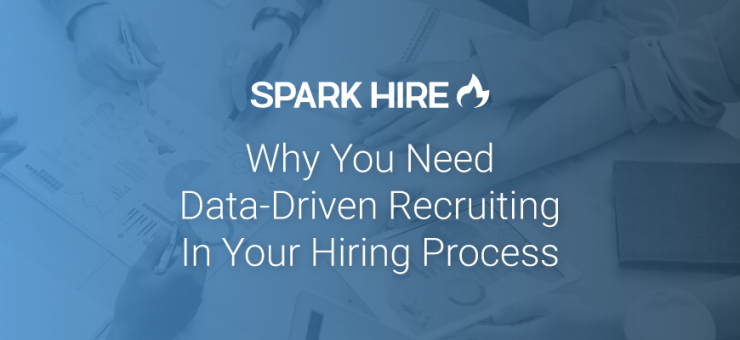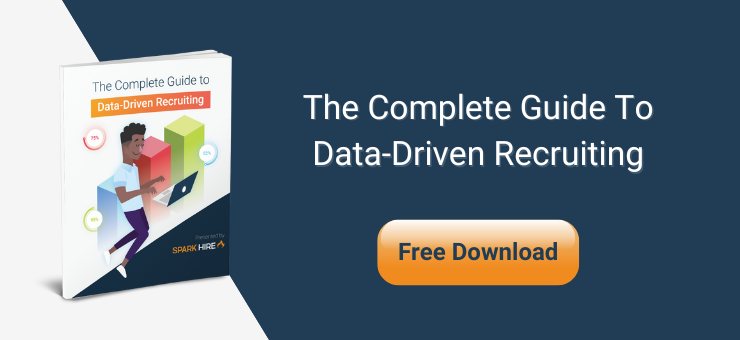You may feel like you’ve tried everything to improve your hiring strategy. The issue is you cannot resolve underlying conflicts by addressing problems on the surface. You have to weed out the source from the infrastructure of your processes. To uncover problem areas, consider diving into data-driven recruiting strategies behind your process.
Data-driven recruiting tackles many ongoing complications hiring and recruiting pros face. It optimizes recruitment by leveraging data through every stage of the process, from job postings to obtaining offer acceptance from new hires, and even understanding what onboarding and retention strategies are most effective.
The process depends on tracking the right metrics, understanding them, and how to employ them to improve every stage of the process. You likely already have the internal data you need at your disposal. However, to benefit from this information, you also need the skills to evaluate and apply this data to make strategic recruitment decisions.
Here’s a look at why you need to adopt data-driven recruitment to hire top talent:
Identify your most reliable recruitment channels
It’s easy to measure recruitment channels based on how many applications you receive from each source and how quickly they filter into your ATS. Unfortunately, the number of applicants isn’t the most valuable metric. You need to know which sources provide the most qualified candidates.
By digging into your source of hire metrics, you can identify what recruitment strategies and channels your most dedicated and efficient employees came from. Sourcing data pinpoints where you consistently access the best talent and enables you to attract and hire similar top performers.
Reduce time to hire
Time to hire is a recruitment metric that’s been around for decades. It’s an important indicator of how well other steps in the recruitment process are working, such as:
- Application to screening
- Screening to in-person interviews
- In-person interviews to offer
- Offer extend to offer accept
- Offer accept to start date.
When analyzed and used effectively, breaking down time to hire data profoundly impacts the efficiency of your hiring process. For example, by identifying which screening processes are most effective, you decrease the time from screening to in-person interviews and the decision-making process by only filtering through the right candidates.
Eliminate impulse decision-making and reduce bias
Impulse or “gut-feeling” decisions wreak havoc on hiring processes. The biggest reason is impulse decisions have a higher potential to result in bias and ill-fitting hires.
Data provides you with hard facts instead of unconscious bias or personal opinions. Your team can use this vital information to make decisions based on what makes a candidate successful in your company and the role.
Turning to reliable data sources in the recruitment process also means candidates who enter the hiring process get a fair assessment of their skills and traits compared to the company’s needs. This improves candidate satisfaction, engagement, offer acceptance, and retention metrics while ensuring your team stays compliant in the hiring process.
Decrease candidate drop-out rates
Without adequately analyzing data, it’s challenging to understand when and why candidates drop out of the recruitment process. And a lack of access to this valuable information forces your team to attempt to fix errors blindly. Inevitably, this aimless guesswork type of A/B testing results in lost time and effort.
Metrics point to the exact stage of the recruitment process where drop-outs occur. As a result, you know exactly what area to hone in on before making any costly or time-consuming changes. If drop-out rate metrics show they’re leaving before fully applying for the role, your team then has the insight to decide how to cut down on your application length effectively.
Improve the candidate experience
Recruiting based on valuable insights leaves more time for nurturing candidate relationships. Your team has more time for personalized communication with candidates because they’re spending less time making candidates wait between the hiring process stages.
Additionally, data-driven recruiting allows you to focus on areas where candidates aren’t satisfied. This means your team can focus their energy on enhancing the candidate experience to improve your acceptance rate, rather than doing damage control to ensure your brand’s reputation and recruiting strategies don’t suffer.
Increase the quality of hire
You measure quality of hire through many parts of the hiring process. In this case, let’s use pass-through rates as an example. If you assess and determine your numbers are low, many candidates — potentially the best-fitting ones — aren’t making it through.
Using data-driven recruiting means that you analyze similarities between candidates who pass through the hiring process. This allows you to determine what filters are potentially keeping the best candidates from getting beyond your initial screens.
You can also use your data to analyze bad hires who do make it to the next step by looking at what traits and skills they consistently lack. By understanding what they’re missing, you know the exact characteristics you need to assess for in the future.
Decrease cost per hire
Budget constraints are almost always a point of frustration throughout the hiring process. The key to creating a budget that aligns with hiring needs is understanding what provides the most value. This makes it easier to eliminate unnecessary budget-eating expenses.
By making better use of data-driven recruiting, you have the insights to improve your strategy and streamline your decision-making processes. Use your analysis to assess which tools and tech produce the highest return on investment. Eliminate inefficiencies to make room in your budget for more effective hiring tools that will continue to save your team time and money.












